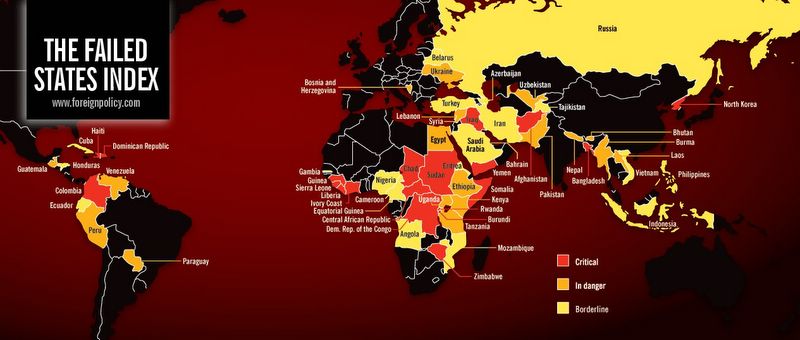 Foreign Policy:
Foreign Policy:
America is now threatened less by conquering states than we are by failing ones.” That was the conclusion of the 2002 U.S. National Security Strategy. For a country whose foreign policy in the 20th century was dominated by the struggles against powerful states such as Germany, Japan, and the Soviet Union, the U.S. assessment is striking. Nor is the United States alone in diagnosing the problem. U.N. Secretary-General Kofi Annan has warned that “ignoring failed states creates problems that sometimes come back to bite us.” French President Jacques Chirac has spoken of “the threat that failed states carry for the world’s equilibrium.” World leaders once worried about who was amassing power; now they worry about the absence of it.
Failed states have made a remarkable odyssey from the periphery to the very center of global politics. During the Cold War, state failure was seen through the prism of superpower conflict and was rarely addressed as a danger in its own right. In the 1990s, “failed states” fell largely into the province of humanitarians and human rights activists, although they did begin to consume the attention of the world’s sole superpower, which led interventions in Somalia, Haiti, Bosnia, and Kosovo. For so-called foreign-policy realists, however, these states and the problems they posed were a distraction from weightier issues of geopolitics.
Now, it seems, everybody cares. The dangerous exports of failed states—whether international terrorists, drug barons, or weapons arsenals—are the subject of endless discussion and concern. For all the newfound attention, however, there is still uncertainty about the definition and scope of the problem. How do you know a failed state when you see one? Of course, a government that has lost control of its territory or of the monopoly on the legitimate use of force has earned the label. But there can be more subtle attributes of failure. Some regimes, for example, lack the authority to make collective decisions or the capacity to deliver public services. In other countries, the populace may rely entirely on the black market, fail to pay taxes, or engage in large-scale civil disobedience. Outside intervention can be both a symptom of and a trigger for state collapse. A failed state may be subject to involuntary restrictions of its sovereignty, such as political or economic sanctions, the presence of foreign military forces on its soil, or other military constraints, such as a no-fly zone.
These states are, and will continue to be a signifigant threat and a challenge to our security. Foreign Policy as provided a valuable service with this index, as it lets us understand that scope and the nature of the challenges we face.





0 Comments:
Post a Comment
<< Home